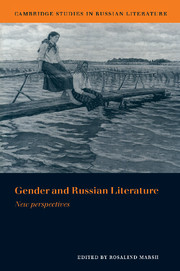Book contents
- Frontmatter
- Contents
- Notes on contributors
- Acknowledgements
- 1 Introduction: new perspectives on women and gender in Russian literature
- PART I HISTORICAL AND BIOGRAPHICAL PERSPECTIVES
- PART II THE PERSPECTIVE OF LITERARY CRITICISM
- 12 The silence of rebellion: women in the work of Leonid Andreev
- 13 Poor Liza: the sexual politics of Elizaveta Bam by Daniil Kharms
- 14 The crafting of a self: Lidiia Ginzburg's early journal
- 15 Voyeurism and ventriloquism: Aleksandr Velichanskii's Podzemnaia nimfa
- 16 Thinking self in the poetry of Ol′ga Sedakova
- 17 Women's space and women's place in contemporary Russian fiction
- Index
- CAMBRIDGE STUDIES IN RUSSIAN LITERATURE
16 - Thinking self in the poetry of Ol′ga Sedakova
Published online by Cambridge University Press: 06 July 2010
- Frontmatter
- Contents
- Notes on contributors
- Acknowledgements
- 1 Introduction: new perspectives on women and gender in Russian literature
- PART I HISTORICAL AND BIOGRAPHICAL PERSPECTIVES
- PART II THE PERSPECTIVE OF LITERARY CRITICISM
- 12 The silence of rebellion: women in the work of Leonid Andreev
- 13 Poor Liza: the sexual politics of Elizaveta Bam by Daniil Kharms
- 14 The crafting of a self: Lidiia Ginzburg's early journal
- 15 Voyeurism and ventriloquism: Aleksandr Velichanskii's Podzemnaia nimfa
- 16 Thinking self in the poetry of Ol′ga Sedakova
- 17 Women's space and women's place in contemporary Russian fiction
- Index
- CAMBRIDGE STUDIES IN RUSSIAN LITERATURE
Summary
Among Russia's contemporary poets, two young women have drawn the attention of critics: Ol′ga Sedakova and Elena Shvarts. This essay, while it will draw some comparisons between the two, will concentrate on Sedakova, whose work has been somewhat less accessible. Sedakova's poetry, admirable for its beautiful formal complexity and for its intricate thought patterns, often resists other characterizations: she is not a poet for whom closure, or certainty, has much appeal. She has disparaged those ‘who would like a guaranteed and perfect organization of everything on earth’, preferring ‘the eternal freedom of the most important things in the world (which extends even to their names)’. When she views naming as an act that liberates meaning, rather than pinning it down, Sedakova is exemplifying for us one verbal process that produces endless chains of signification in her poetry rather than fixable entities with which to build. The same structure emerges in her work at the level of ideas. Sedakova writes about processes of thought, about the emotions that surge when one turns an idea over in the mind, rather than the discoveries that thinking can yield. She is a meditative poet whose lyrics circle the eddying currents of mental change.
Even in her shorter poems, Sedakova does little to ease our entry into her ways of thinking about the world. Her poems frequently omit the familiarizing first moves that teach readers how to proceed, which is to say that for those who come for the first time to Sedakova's poetry, the experience can be frustrating and unsettling.
- Type
- Chapter
- Information
- Gender and Russian LiteratureNew Perspectives, pp. 302 - 325Publisher: Cambridge University PressPrint publication year: 1996
- 2
- Cited by



